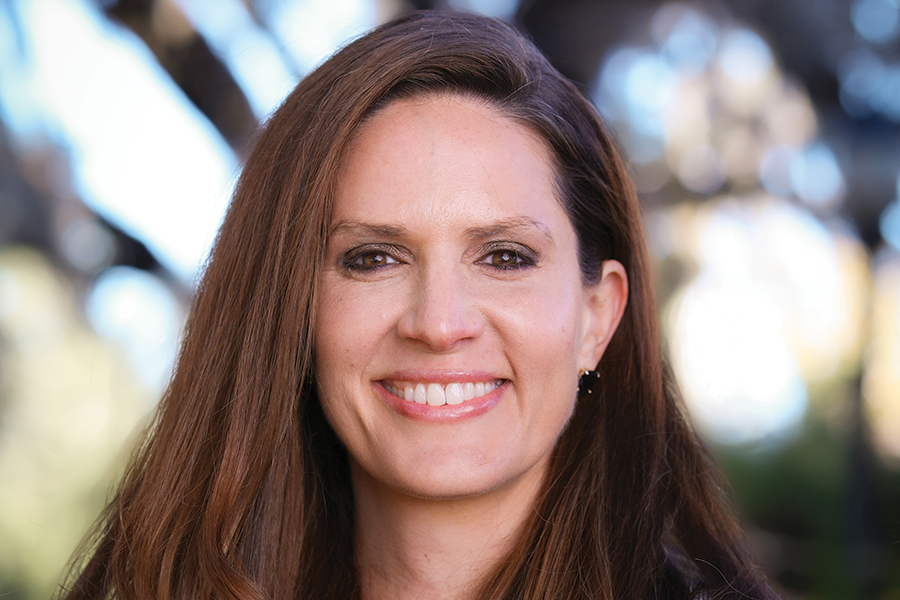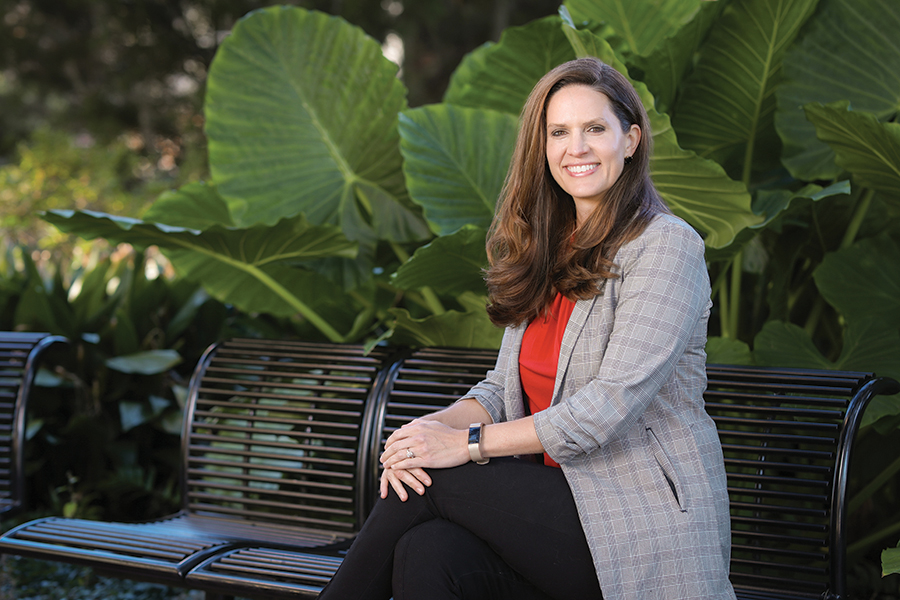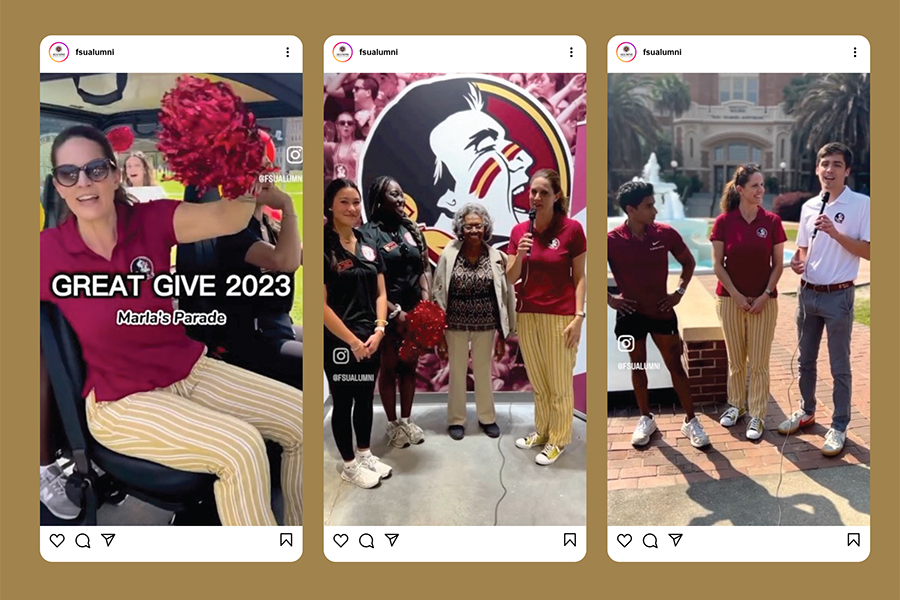On the Advance
Vice President for University Advancement and FSU Foundation President Marla Vickers brings Nole knowledge to leadership role

When Marla Vickers looks out her office window over Florida State University’s Westcott Plaza, she feels right at home. That’s because Vickers, vice president for university advancement and president of the FSU Foundation, is an FSU alumna herself, having earned a master’s in public history and historic administration here in 2000.
Vickers brings more than two decades of experience in higher education to her position, gained in development roles at Emory University, Yale University, the University of Chicago, George Washington University, Duke University and Georgetown University. She holds a bachelor’s from the University of Georgia and an MBA from GWU, and she is currently pursuing a Doctor of Education from Vanderbilt University.
At FSU, Vickers spearheads the university’s academic fundraising and alumni relations and oversees a diverse endowment portfolio with 2,114 endowed funds totaling $723 million as of June 2023.
Spectrum Magazine sat down with Vickers to learn more about her vision for FSU and her perspective as a graduate of the College of Arts and Sciences.
Spectrum Magazine: You returned to FSU just over a year ago after serving in senior fundraising roles at some of the nation’s top institutions. How did those roles prepare you to lead here?
MV: Having the chance to come back to my alma mater in this capacity is a dream. My 20 years at various universities, all of that knowledge and experience, and the wonderful people I’ve learned from, culminated in taking on this role. Being the first woman vice president of university advancement at FSU is truly a dream come true. I feel honored and incredibly lucky.
SM: FSU has cemented its status among the nation’s top public universities in terms of both student success and research activity. How does the FSU Foundation support university success?
MV: Philanthropy plays an incredible role in our nation’s public and private institutions. The State of Florida has been very generous in providing substantial funding to FSU. However, philanthropy covers the gap state funding leaves as well helping FSU achieve an extra margin of excellence in a variety of areas that are historically underfunded. With 400,000 alumni, plus a sizable population of FSU parents and friends who give, philanthropy enables FSU to keep rising.

SM: Tell us about the university advancement model and what it means for FSU’s fundraising and alumni relations activities.
MV: The university advancement model is an integrated model I’ve worked with President Richard McCullough and my senior leadership team to build over the past year. Through this integrated approach, we can have broader impact across the university and our alumni base, allowing us to be more engaged in the academic arena and aligned more closely with our colleagues outside of advancement, including in athletics and Seminole Boosters.
Think of university advancement as a garnet-and-gold umbrella. The FSU Alumni Association, all academic fundraising activity, all advancement events and communications, and all advancement services functions that were formerly part of the FSU Foundation as separate areas are now unified under one university advancement umbrella.
Among FSU’s hallmarks is its interdisciplinarity, so fundraisers now have greater ability, both organically and collaboratively through the new structure, to, for example, present funding opportunities to donors where the intersection of science and business meet in ways they couldn't before. The opportunities for collaboration are unlimited.
SM: How has your experience as an FSU student and alumna shaped your approach to this role?
MV: This role is very personal. I came to FSU right out of undergrad and received a full scholarship. That was a game changer for me financially. FSU had a great reputation then, particularly for my program, and now it is even stronger. When I speak to FSU alumni, parents, and friends, I start with my story because I’m from a single-parent family and could not have pursued graduate school without that critical scholarship support. I had the pleasure of working with former Governor Ruben Askew as his personal archivist for two years as a graduate student, cataloging his personal memorabilia as part of the work of the Florida Institute of Government. I know definitively how truly special that experience was, and I often share my experience working with Governor Askew with alumni I meet.
“Having the chance to come back to my alma mater in this capacity is a dream. Being the first woman vice president of university advancement at FSU is truly a dream come true. I feel honored and incredibly lucky.”
— Marla Vickers
SM: What are some of your fondest memories from your time as an FSU student? What does it mean to you to be part of the team creating those memories for a new generation?
MV: I was studying U.S. history with particular emphasis in the Civil Rights era and worked with [history professor emeritus] the late Neil Jumonville. He and other faculty have continued to influence me over the years. That direct faculty interaction was key, and now I’m aligning relationships with alumni and their former professors to experience those "reunion moments." It’s been magical to play a direct hand in orchestrating that for alumni who aspire to reconnect with faculty who have influenced their lives and careers.
SM: How has your FSU experience contributed to your career success?
MV: My experience as a graduate student here impacted nearly everything I’ve done professionally. Foundationally, it’s the critical thinking and synthesizing of information — I was challenged in ways I hadn’t been before. I will always be grateful for the opportunities to build confidence and courage to interface with academics, deans, and even the governor. After grad school, I began working for the mayor of Nashville, Tennessee. I wouldn’t have had the confidence and political know-how to do that if I hadn’t spent two years working with Governor Askew and various professors at FSU.
SM: College of Arts and Sciences alumni account for more than 25% of living FSU graduates, from age 22 to 102. What would you most like your fellow Arts and Sciences family members to know about the lifelong value FSU brings to alumni and why it’s important they continue to invest in FSU?
MV: No one can take away your education. Having a degree from FSU, particularly from my own experience as an A&S graduate, led me to appreciate interdisciplinarity. Among the many strengths of the college is the exposure students have to a variety of disciplines — that exposure impacts your ability to think differently. That’s the biggest takeaway: Whether you’re a mathematician, a geologist, or in the humanities, as an A&S graduate, you are touched by experiencing the interplay of those disciplines and how they affect our world.
As a graduate, I encourage alumni to invest in FSU and give back however they can. Private support, whether it’s $1 or $100,000, really matters. I see the difference philanthropy makes through both small and large gifts. You’re affording future generations of FSU graduates the same kind of experience you had, or better. Private philanthropy truly makes the difference, especially at public universities like FSU.
SM: What advice do you have for new alumni as they step into their next chapters?
MV: First, be yourself. Authenticity matters. I’ve met so many alumni this past year, and FSU grads are uniquely themselves. Second, go for it as you launch your career, and go big! We have a robust network of 400,000 alumni worldwide. Everywhere you turn, there's an opportunity to connect with an FSU grad, whether it's through Seminole Clubs or alumni networks supported by the FSU Alumni Association — we’re here to help you stay connected to your alma mater. You’re never alone.

